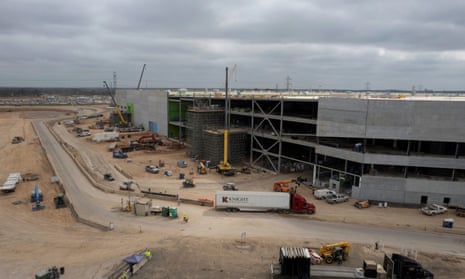Construction workers who toiled on one of Tesla’s sprawling so-called gigafactories will file a complaint and a case referral with the federal Department of Labor on Tuesday detailing exploitative work conditions they say they experienced while building the plant.
Whistleblowers came forward to allege serious labor and employment violations during construction of the electric car manufacturer’s massive new facility in Austin, Texas, that left them vulnerable to injuries and wage theft.
Amid accusations of constant hazards and onsite accidents, one worker said his bosses at an unnamed subcontractor falsified credentials instead of actually providing him and others with required job training involving education about health, safety, and workers’ rights – including the right to refuse dangerous work.
Other whistleblowers are reporting what they describe as wage theft and say they weren’t paid at all or didn’t receive proper overtime compensation for their work on the hi-tech facility.
“Nobody deserves what happened in the gigafactory to happen to them, or their family members, or whomever,” Victor, a worker who asked the Guardian to withhold his last name out of fear of retaliation, said in an exclusive interview about working conditions, adding: “I don’t think it was humane.”
Tesla’s 2,500-acre Austin gigafactory was one of the hottest construction jobs in the US after workers broke ground on it in 2020, as multi-billionaire entrepreneur and owner of Tesla, SpaceX and now Twitter, Elon Musk, erected a central US outpost for his auto manufacturer. From outside the project, the new plant sounded like an ideal place for any builder to work.
The company chose a convenient location along the Colorado River near Austin’s airport, which Musk touted as an employment opportunity for thousands where he will manufacture the long-delayed electric pickup Cybertruck. Back in April, Musk donned sunglasses and a black cowboy hat at a “Cyber Rodeo” celebrating the venue’s initial opening.
But construction workers have painted a far less rosy portrait of the new factory, suggesting what was supposed to be a dream job turned into a nightmare.
On Tuesday, Victor is filing a complaint with the Occupational Safety and Health Administration (Osha), part of the Department of Labor, over alleged fake certificates of completion for required training he says never happened.
He told the Guardian that his team was directed to work on the metal factory roof at night with no lights, labor on top of turbines that were blowing smoke without protective masks, and otherwise put themselves at risk without basic information on how to stay safe.
In one instance, Victor said he and his colleagues were expected to keep up production on a flooded first floor – despite observing there was live wiring all over the place and cords in the water. He remembers telling his wife: “I’m going to die in this factory.”
On another occasion, Victor worked with a man who was so desperate for money he returned to the job in a brace after breaking his arm on site.
“Every day, there was a safety issue,” he told the Guardian.
Other workers sacrificed time with their loved ones to keep building the factory over Thanksgiving last year but say they never received the double-pay bonuses they had been promised, according to Tuesday’s case referral to the federal Department of Labor’s wage and hour division.
In an industry as fragmented as construction, with its vast network of contractors and subcontractors, workers’ rights advocates contend that developers like Tesla are ultimately the ones with the power and moral authority to demand fair working standards.
Yet “Tesla was not – didn’t seem – interested in using their power to ensure that everyone was able to go home at the end of the day without injuries, with all the money that they’re owed in their pockets,” said Hannah Alexander, a staff attorney for Workers Defense Project, a non-profit helping the construction workers.
Tesla did not immediately respond to a request for comment, while Workers Defense Project did not share identifying information about the contractors and subcontractors accused of labor violations for confidentiality reasons amid a pending investigation.
This is not the first time that Musk’s car company has been linked to safety violations.
In recent years, Tesla’s plant in Fremont, California, has far outpaced other major US auto plants for Osha violations, incurring over $236,000 in fines between 2014 and 2018. Likewise, at its factory outside Reno, Nevada, workers have experienced a slew of injuries, including amputations.
By 2020, when the company set its sights on Austin for another factory, accusations of a too-casual relationship to workers’ rights had traveled far, and a broad coalition of labor groups, advocates, and county residents told local government that any deal with Tesla would need to include strong worker protections.
But amid tight competition with other cities also trying to win Tesla’s billion-dollar investment, local officials greenlit a plan to draw the electrical carmaker in with millions in tax rebates – and without the enforcement mechanisms advocates warned were necessary.
Now, some workers are dealing with the upshot.
“Everything that we’re seeing is complicated by the fact that there isn’t a whole lot of transparency or accountability because they decided not to include that independent monitoring piece,” said David Chincanchan, Workers Defense Project’s policy director.
“In general, the state of the construction industry in Texas tends to be just a race to the bottom,” Chincanchan asserted, where exploitation of many vulnerable workers, often immigrants, runs rampant.
Amid Tuesday’s filings, the Austin gigafactory is now under fire.
“Everybody’s at fault,” Victor said. “Anybody could have prevented it. Tesla could have prevented it.”
